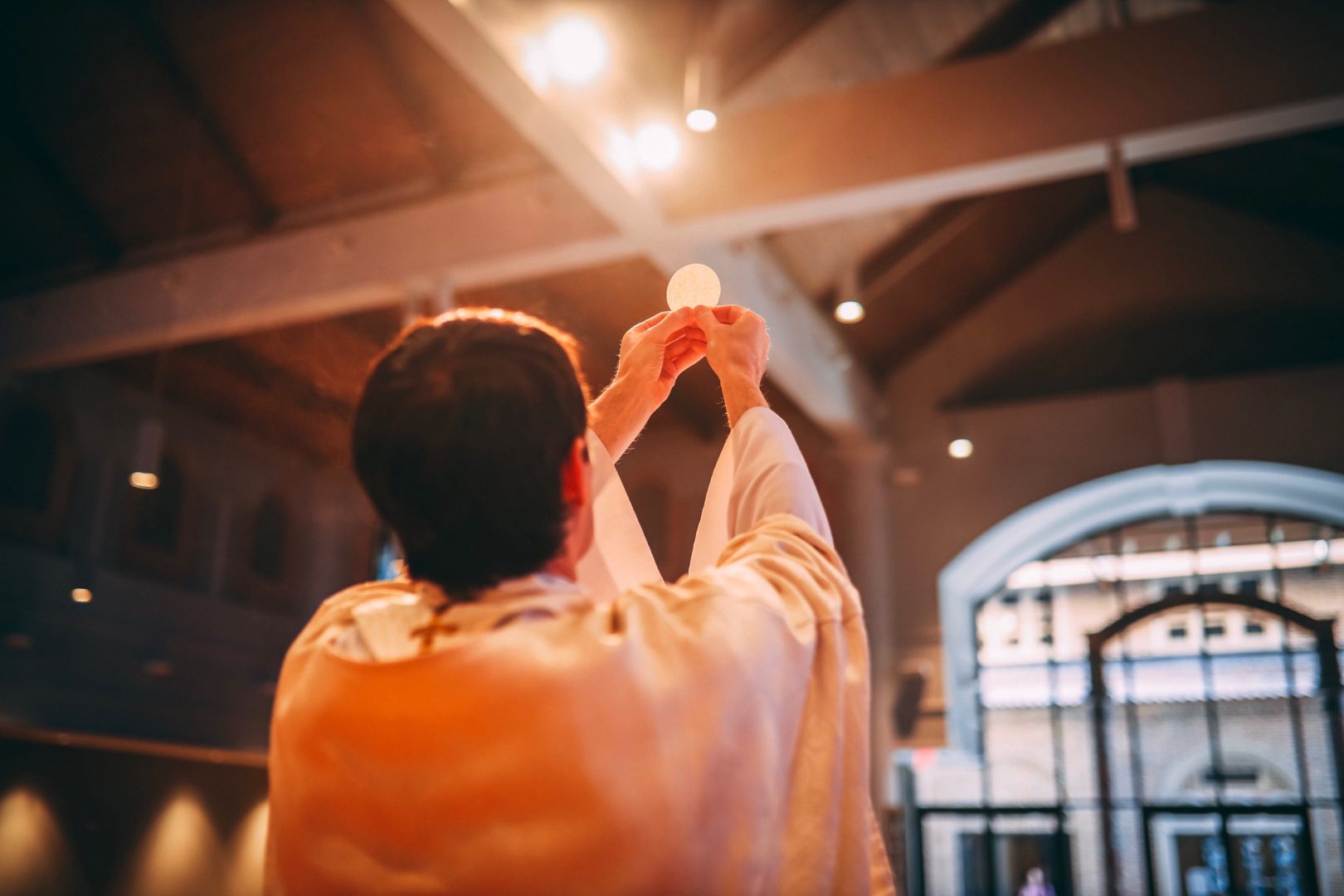Jesus said: “I am the living bread that came down from heaven; if any one eats of this bread, he will live for ever; . . . he who eats My flesh and drinks My blood has eternal life and . . . abides in me, and I in him.” (John 6:51,54,56) “The Eucharist is the heart and the summit of the Church’s life, for in it Christ associates his Church and all her members with His sacrifice of praise and thanksgiving offered once for all on the cross to His Father; by this sacrifice He pours out the graces of salvation on His Body which is the Church.”
Christ the King’s Mass schedule can be found at the bottom of this page.
Adults seeking to receive their First Eucharist can find information on the OCIA page.
We do not currently offer a program to prepare children for First Eucharist.
We host first communion Mass for children in the spring for those who have been fully prepared.
FAQ’s
Christ instituted the first Mass beginning on Holy Thursday night at the Last Supper and leading into Good Friday when He offered Himself once and for all on the cross as a sacrifice in atonement for all the sins of the world, yours and mine alike: “This is My body given up for you. This is My blood shed for the forgiveness of sins.”
Although Christ offered Himself as a sacrifice once and for all upon the cross, He intended that His Church down through the ages would have access to and participate in that one saving event by means of the Mass: “Do this in memory of Me.”
The Mass is not simply a symbol or a re-enactment of a past event, but a real participation in that one saving event made present on the altar today. That is why the Mass is the supreme form of prayer and worship for a Catholic.
If you have never been to Mass before we understand that it may feel foreign at first, and some parts will seem confusing. Broadly, the Mass is divided into two main parts: Liturgy of the Word and the Liturgy of the Eucharist.
During the Liturgy of the Word there are various prayers, readings from the Old and New Testament, a homily, and the whole congregation recites the Creed together.
In the Liturgy of the Eucharist the sacrifice of Christ at Calvary becomes present on the altar, the Catholic faithful receive the Holy Eucharist, and spend some time in thankful reflection before the final blessing/dismissal.
Books are typically available in the pews which you can use as a reference. If you are thinking of coming to Mass and are nervous we suggest you come a few minutes early. You can even simply observe from the back if that is more comfortable. After Mass you are more than welcome to speak with a priest about your experience.
Christ came not to leave us symbols, but to bring us supernatural life – His own divine life! The Holy Eucharist is not a symbol but actually the real, living presence of our Risen Lord (body, blood, soul, and divinity).
When Catholics receive Holy Eucharist, it is an act of unity with all those in the Catholic Church throughout the world, an act of belief in the Real Presence of Christ in the Eucharist. Therefore, only those who believe in the True Presence may receive the Eucharist and take part in this sacrament of unity with Christ and His Church.
The sacraments are the primary and ordinary means by which God gives and increases this supernatural life. Just as any living thing needs to be born and fed to live, similarly, every person needs to be supernaturally born (Baptism) and fed (Eucharist) in order for the divine life to grow.
We should always approach the Eucharist with respect, gratitude, faith, love, and worship.
Thank you for your interest in assisting with the Liturgy of the Mass at CTK. Please read the descriptions below for the available positions and fill out this interest form!
- Lector – Proclaim the Scripture readings
- Eucharistic Minister of Holy Communion (EMHC) – Assist the priest with distribution of Holy Eucharist to the faithful.
- Usher – Assist with the Sunday collection
